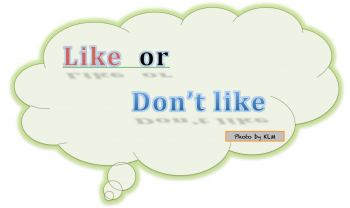Like or Don’t Like in Korean Posted by Kyung-Hwa on Feb 22, 2017 in Grammar, Korean Language, Vocabulary
Do you like studying Korean? Like or Don’t like can be used to express your interests or preferences in food, hobby, music, person, place, and thing. Knowing how to express your preferences would be a useful skill to communicate with Korean speakers.

How would you answer these questions in Korean?:
- “What is your favorite Korean food?”
- “Do you like coffee or tea?”
- “Who is your favorite K-pop singer?”
In order to express your interests or preferences to others, you can simply say “좋아해요 (like)” Let’s try to answer the above questions:
________을/를 좋아해요. (I like _________.)
Ex)
• A: What is your favorite Korean food?
B: 김치찌개를 좋아해요. (I like Kimchi Stew.)
• A: Do you like coffee or tea?”
B: 커피를 좋아해요. (I like coffee.)
• A: What is your favorite K-pop group?
B: 빅뱅을 좋아해요. (I like Big Bang.)
* ~을/를 : object markers in the Korean language.
- When a noun ends in a consonant: noun + 을
ex) 빅뱅 (Big Bang) +을 : 빅뱅을
- When a noun ends in a vowel: noun +를
ex) 커피 (coffee) + 를 : 커피를
How would you ask someone his or her preferences?
• A: 가장 좋아하는 한국 음식이 뭐예요? (What is your favorite Korean food?)
B: 김치찌개를 좋아해요. (I like Kimchi Stew.)
• A: 커피가 좋아요, 차가 좋아요? (Do you like coffee or tea?)
B: 커피를 좋아해요. (I like coffee.)
• A: 어떤 케이팝 그룹을 가장 좋아해요? (What is your favorite K-pop group?)
B: 빅뱅을 좋아해요. (I like Big Bang.)
How about when you don’t like something? There is an easy way to change “like” into “don’t like”. You can simply add “안 ” to “좋아해요” to express your dislikes.
Let’s try to change above examples of “like something” into “don’t like something”
For example,
________을/를 안 좋아해요. (I don’t like _________.)
• A: 김치찌개를 좋아해요? (Do you like Kimchi Stew?)
B: 김치찌개를 안 좋아해요. (I don’t like Kimchi Stew.)
• A: 커피를 좋아해요? (Do you like coffee?)
B: 커피를 안 좋아해요. (I don’t like coffee.)
• A: 빅뱅을 좋아해요? (Do you like Big Bang?)
B: 빅뱅을 안 좋아해요. (I don’t like Big Bang.)
Although there are several ways to form questions in Korean, I would like to introduce a very simple way to turn a statement into a question without using question words such as who, what, where, why, when, and how.” This is how: For a question, all you need to do is to raise the intonation at the end of the sentence. I would love to hear your answer to this question:
I would love to hear your answer to this question:
가장 좋아하는 한국 음식이 뭐예요? (What is your favorite Korean food?)
______________ 을/를 좋아해요.
Ex) 비빔밥을 좋아해요. (I like Bibimbop.)
감사합니다! (Thank you!)
***Related Vocabulary***
- 좋아해요 (verb. like)
- 김치찌개 (Kimchi Stew)
- 커피 (coffee)
- * ~을/를 : object markers in the Korean language.
♦ When a noun ends in a consonant: noun + 을
ex) 빅뱅 (Big Bang) +을: 빅뱅을
♦ When a noun ends in a vowel: noun + 를
ex) 커피 (coffee) + 를: 커피를
- 가장 좋아하는 (favorite)
- 한국 음식 (Korean food)
- 차 (tea)
- 어떤 (What, which, some )
- 안 좋아해요. (dont’ like)
- 김치찌개를 안 좋아해요. (I don’t like Kimchi Stew.)
- 커피를 안 좋아해요. (I don’t like coffee.)
- 가장 좋아하는 한국 음식이 뭐예요? (What is your favorite Korean food?)
- 비빔밥을 좋아해요. (I like Bibimbop.)

Build vocabulary, practice pronunciation, and more with Transparent Language Online. Available anytime, anywhere, on any device.




Comments:
Bob:
Thank you for your blog on Korean language and culture. I lived in Korea for a number of years, teaching English. I found it to be a fascinating culture. Your explanations about Korean language are very clear and easy to follow.
Kyung-Hwa:
@Bob 안녕하세요!
Thank you very much for your kind and supportive words. I am glad to hear that my explanations are clear and easy to follow. Many of my friends think Korean is a difficult language to learn, so I think about them when I write my articles.
I hope you have had a great experience in Korea.
감사합니다 ;^^~